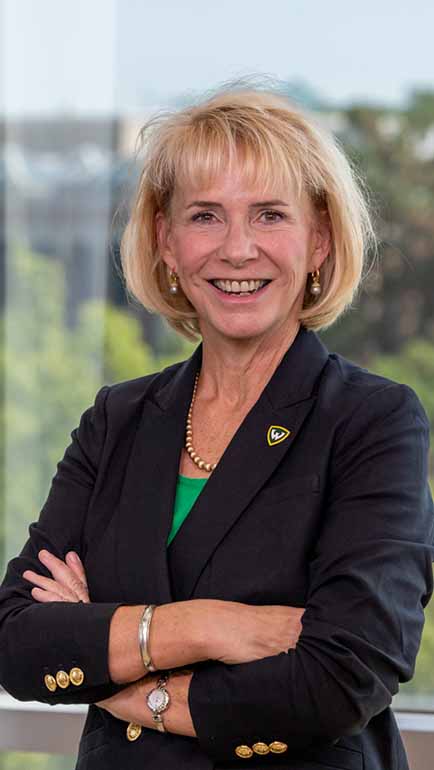
After two months of speaking with people at all levels throughout the university, Wayne State President Kimberly Andrews Espy, Ph.D., has decided to implement a number of organizational changes that will better focus the talent and resources of the university in line with its strategic plan, “Our Moment in Time.”
“I have reviewed the hundreds of comments submitted to me, talked to many stakeholders, and I am ready to begin shaping the organization for the work ahead by our university leadership,” said President Espy. “We have so much talent at Wayne State, and everyone I’ve spoken to is deeply committed to our mission. These changes will help us better serve that mission and realize our goals by streamlining decision-making, coordinating activities and building a collaborative culture in line with our values.”
One of the key changes follows on the heels of the planned retirement of Michael Wright, vice president for marketing and communications and chief of staff.
“Michael has served Wayne State well over the last 16 years, and we are grateful for all he has done,” President Espy added. “His retirement has provided me an opportunity to rethink my leadership team based on what is needed to successfully navigate the future.”
Rather than replace Wright’s dual role, President Espy will conduct an external search for a chief of staff and university relations officer who will lead and oversee Government and Community Affairs, University Marketing and Communications, and the board office.
“This leadership role will strengthen and better integrate our external-facing, institutional advocacy strategy and operations better, and also complements the academic portfolio of Provost Mark Kornbluh and the Finance and Business Operations under Vice President David Massaron,” said President Espy.
To better the university’s approach to how its leaders collaborate cross-functionally on operational matters and to intentionally bring multiple voices to guide process improvements, the president has formed a University Leadership Council (ULC), chaired by Provost Kornbluh and Interim Vice President for Research Tim Stemmler. The role of the council is to:
- Facilitate institutional, enterprise thinking across executive and academic leadership to advance the university as a whole.
- Provide a venue for collective consideration and vetting of important operational matters from multiple perspectives, including those of shared governance bodies.
- Advance process improvements through consideration of campus administrative, operational practices and peer benchmarking.
- Afford ability to provide input into institutional leadership initiatives planning, implementation and evaluation, including disseminating information from and/or gaining input into the ongoing activities.
- Assist in initiative prioritization and build consensus about overall campus needs, actions and outcomes.
“This council will promote deeper connection and articulation between work of the executive and academic leaders, as well as include important shared governance leader perspectives,” said President Espy.
An internally focused administrative modification in the Office of the President is the establishment of an assistant vice president for operations and strategic initiatives, who will direct the Office of the President staff; manage executive team activities; and regularly coordinate with other divisions to ensure effective, harmonized operations toward the most important goals. The search for this position should conclude within the next couple of weeks.
Additional changes throughout the organization include moving WDET and the University Press to the Office of the Provost, realigning Business Innovation & Technology Commercialization to the Office of Research and Discovery, and placing public safety under Finance and Business Operations.
“All of these changes are intended to get the various units throughout the university better aligned and working together,” said President Espy. “Undergirded by our commitment to deep and broad engagement with our communities and our shared values to promote diversity, equity and inclusion, this reorganization will help us work more efficiently, and improve our effectiveness as an organization.”
